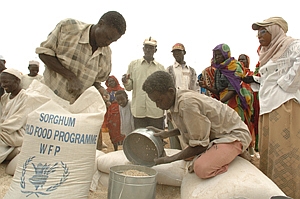Food Security: Africa Woos Italy

 |
| Aid workers distribute food aid Photo Courtesy |
Although African agriculture has not been doing well over the years, the high potential it has provides a good opportunity for investment, high rates of return, food and nutrition as well as socio-economic development. There is need to stimulate small-holder farmers. There is need to complete the entire value chain with agribusiness. This is where Italy should come in drawing from its own experience which started with cottage industries and built on that to make the current impressive economy based on agro-industries.
The prices of agricultural commodities are currently high. This has generated interest for increasing investment in agriculture, which is positive and beneficial especially for agro-processing. This is, therefore, an opportune time for Italy to step up its interventions in Africa.
In order to ensure agricultural production, productivity, food and nutrition security, as well as to provide the required enabling environment, the African Heads of State and Government adopted the Comprehensive Africa Agricultural Development Program (CAADP) – just like the European Union has the Common Agricultural policy - to address constraints facing Africa’s agriculture and to develop and implement policies, programs and activities to boost agricultural production and productivity at national and regional levels. The pillars of CAADP aim at: Extending the area under sustainable land management and reliable water control systems; Improving rural infrastructure and trade-related capacities for market access; Increasing food supply, reducing hunger, enhancing risk management and improving emergency response; and ensuring agricultural research, technology dissemination and adoption.
A reasonably high number of countries have accelerated the implementation of CAADP by preparing country investment plans and scaling up their budgetary allocations to the agricultural sector. The Italian Africa Plan could work within the framework and processes of CAADP to drive the agribusiness and agro-processing. It could also build on the commitments of the Development of Agribusiness and Agro-Industries in Africa. The African Union Commission appreciates the invitation from the Italian Government and the move to engage Africa directly as one of its principal partners.
The challenges for agribusiness and agro-industries in Africa cannot be viewed in isolation but within the context of a complex agricultural innovative system to provide a springboard for agricultural production, marketing and agro-processing. Modern technologies are crucial for both cottage industries and medium-scale entities. This calls for public private partnership and putting in place appropriate policies and regulatory infrastructure for ensuring compliance with quality and standards to complete the value chain system and enhance market access. Here, the role of both African governments and the Italian government is critical in playing a facilitating role and providing an enabling environment for the private sector.
The leadership of the African continent is fully supportive of ensuring that African agriculture is developed. At the recent AU Summit, H.E Prof. Bingu wa Mutharika, President of the Republic of Malawi, who is current Chairman of the African Union, did single out among the key priorities, the pursuit of food security as a five year commitment.
In relation to food safety, African agro-investors have experienced technical challenges to comply with international standards which demand rigorous and expensive assessment especially with regard to laboratories for accreditation. African countries need support-both technical and financial to meet these requirements. For Africa, the challenge is to generate growth, become competitive, and take charge of its own future.
Although it remains the worst affected with poverty, Africa has opportunities for mutually beneficial trade and investment. It has a large and growing population. Efforts are being intensified by the African Union and its building blocks, the Regional Economic Communities to accelerate the pace of regional integration and the establishment of a Pan-African Common Market in which goods, capital and people will move freely between countries. Rates of return on investment on the continent are among the highest in the world.
The African Union Commission sees Africa as one continent. We encourage a courtship that brings value in the transactions on both ends of the deal, between the Italian companies and businesses and private sector and the African partners and counterparts. Our investors rightly deserve financial rewards commensurate with their input while the communities providing the natural resources or raw materials must also retain their right to continue enjoying the goodness of the land. This means putting in place for investors’ codes of practice that respect the highest standards for operational excellence as well as business ethics; codes that have products with supply competitiveness, demand conformity and market connectivity.
Italian public and private partners should step up cooperation with Africa in some of the following areas: Agri-business development through storage, packaging, standardizing and, above all, agro-processing through joint venture; Technology transfer; Post-harvest handling and marketing infrastructure; Local capacity building through on-the-job training and apprenticeship; Enhancing risk management mechanisms to protect our investments in agriculture from recurring, predictable weather shocks.
Given that the African Union has put in place guidelines and a code of conduct for investing on land, we would like to see joint ventures for enhanced agricultural production which promote a win-win situation for local and foreign partners.
I welcome the proposed partnerships between Italian states and African regions on mutual basis, the proposed project of Master in Business Internationalization for post graduate students, and the Roundtable conferences on Italy –Africa partners in Business as a way forward to bring anticipated benefits to our two economies in furtherance of our mutually-beneficial engagements. I look forward to “Made in Africa in exchange for Made in Italy.”
By H.E. Tumusiime Rhoda Peace,
Commissionner, Rural Economy and Agriculture, African Union Commission
